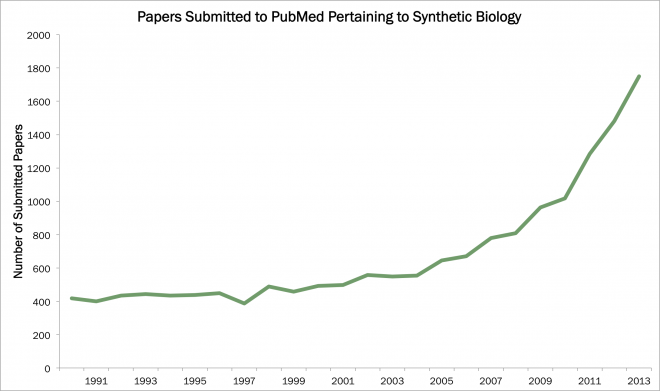
OpenPlant, an open source initiative,[1] recently granted £12 million ($20 million) to the University of Cambridge and the John Innes Centre to develop a DNA registry for synthetic biology research focused on plants. OpenPlant treats plant genes and molecular pathways like circuits that can be arranged in various combinations to create entirely new species. One of its main goals is to design new plants that can produce different chemical compounds, such as oils or vaccines.
A recently opened factory in Moema, Brazil can produce 100,000 metric tons of oil annually, all from genetically modified algae. The factory, a joint venture between Bunge Ltd. [BAYRY] and Solazyme Inc. [SZYM], relies on Solazyme’s ability to design and create custom algae that transforms plant sugar into renewable oils. Synthetic biology, is a young field with a growing body of research, as shown below. Because it has gone open source, the rate of innovation should increase dramatically.

OpenPlant could disrupt traditional chemical companies such as Dupont [DD] and Dow [DOW], but may elevate the importance of a company like Solazyme. With the help of OpenPlant, Solazyme’s algae-based factories could one day produce important chemicals in addition to oils.
As OpenPlant targets more than oils and chemicals, the number and quality of genetically modified agricultural organisms (GMOs) could expand meaningfully. Crowd-sourced genetic engineering could challenge the proprietary algorithms and traits that companies like Evogene [EVGN], Monsanto [MON], Syngenta [SYT], Dupont, and Bayer [BAYRY] have evolved during the last 20 years. Alternatively, if these companies embrace this open source movement, they could lower R&D costs significantly and speed time to market, thanks to their deep libraries, knowledge of the market, and distribution channels.





